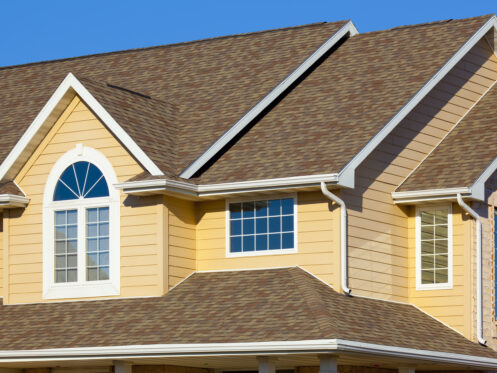Prefabricated roofing has been a popular choice among homeowners and builders seeking a faster, more efficient alternative to traditional roofing processes. These factory-made roofing components are designed for simple assembly and installation, saving substantial time and money. However, while prefabricated roofing might be an excellent choice for some, it is not without drawbacks.
At Fraser Roofing, LLC in Rock Hill, SC, we help homeowners choose from a variety of roofing options. We know how important it is to take into consideration each pro and con when making a decision. Here, we’ll explore the reasons why prefabricated roofing may or may not be right for you and your family.
What Is Prefabricated Roofing?
Prefabricated roofing refers to roof components that are pre-manufactured in a factory before being moved to another spot for assembly and installation. Unlike traditional roofing, where materials are cut and assembled on-site, prefabricated sections are produced with precision to fit specific design requirements. These panels can be made from metal, shingles, or even concrete, and can be customized for different architectural styles.
Pros of Prefabricated Roofing
One great thing about premade roofs is how quickly they can be put up. Because the parts are already made in a workshop, putting the roof together on-site takes a lot less time. Roofing that isn’t prebuilt often only takes a few days. Depending on the size and complexity of the roof, traditional roofing can take days or even weeks. If a person wants to finish their roofing job quickly, whether it’s a new roof or an old one, prefabricated roofing is an easy and quick choice.
There are also ways that prefabricated roofs can save you money. First, labor costs are often cheaper than traditional roofing methods because the work takes less time to do. Fewer workers are needed for shorter periods of time, which means that projects that require a lot of labor cost less. Most of the time, there is less waste than with standard roofing jobs because the materials are made in large quantities in a plant. This smart use of materials can help reduce the total cost of the job.
The factory’s controlled environment makes sure that the accuracy and quality of the premade roofing parts. Modern machinery is used to make the parts, so there is less room for mistakes than when they are cut and put together by hand on-site. This makes the panels or parts more uniform, which can make the roof last longer and be more robust. In a plant, quality control is easy to handle, which makes it less likely that there will be mistakes or problems.
A lot of the time, prefabricated roofing parts are made to last in bad weather. Because they are made in a controlled setting, the companies that make them can make sure that the materials are treated to be resistant to things like UV rays, rain, and wind. Metal and other long-lasting materials are used to make a lot of premade roofs, which are great for keeping out bad weather. This can be a big plus for people who live in places where bad weather is common.
Also, prefabricated roofs might be better for the environment than the old ways of doing things. In a workshop, the process of making things usually wastes less energy and less material. A lot of premade roofs are also made from materials that can be recycled, like metal or concrete, which is better for the earth. People who want to live in a greener world might like the long-lasting benefits that premade roofs can provide.
While some people think that premade roofs limit design choices, this isn’t always the case. A lot of makers let you change things to fit different types of architecture. To match the style of your home, you can pick one in a range of shapes, sizes, and materials. Because of this, premade roofing is a good choice for people who want to find a balance between speed, cost, and creative freedom.
Cons of Prefabricated Roofing
Although there are ways to make it your own, there might not be as many as with traditional roofs. Standard sizes and styles are used to make prefabricated roofs, which can limit your options if you have a very specific or complicated roofing need. It may still be possible to make designs that are unique, but they may cost more and take longer to make. Traditional roofs might be a better choice if you have a particular style of building or need particular materials.
Transporting premade roofs is one of the most challenging parts of using them. Although the parts are made somewhere else, they still need to be brought to your place. This can cause delays or extra costs. Large premade panels may also need special ways to be moved, which makes things more difficult. There are some kinds of prefabricated roofing systems that might not be able to be put in some places, especially those that are farther away.
Even though prefabricated roofs can speed up the installation process, it still needs to be done by skilled professionals to make sure everything is put together correctly. It takes skill to precisely line up the prefabricated parts and firmly connect them, and not all roofing contractors may have experience with these systems. To avoid problems with the end result, homeowners will need to hire roofers who are trained and experienced in putting on premade roofs.
Prefabricated roofing can be more expensive at first than traditional roofing, but the total job may cost less because there is less work and waste. The price can go up because the materials are often made with high-tech tools and materials, which can make them more expensive. For some homes, the higher cost upfront might be a problem, even if the savings in the long run make up for it.
Prefabricated roofing may not work well on older homes that have unusual building features or plans. The parts are made in standard sizes, so they might not fit appropriately on homes with odd shapes, complicated rooflines, or older building methods. Traditional roofing methods, where materials are cut and put together on-site, may be better for these situations and the needs of the home. People who own older homes should carefully think about whether premade roofs will meet their home’s structural and aesthetic needs.
Other Roofing Options
There are a lot of different roofing choices that people think about when they don’t want to use premade roofs. Asphalt shingles are often chosen because they are cheap, come in many colors and shapes, and are easy to put on. Metal roofing is known for being long-lasting and resilient. It protects against bad weather and saves energy, but it may cost more at first.
Clay and concrete tiles look different and last a long time, which makes them great for hot places. Wood shakes give a house a natural look, but they need extra care. Lastly, rubber or composite shingles look like regular materials but are more durable and long-lasting, which makes them a popular choice among people who care about the environment. The best choice for a homeowner is usually based on their own wants and preferences, as each solution has its own pros and cons.
Professional Prefabricated Roofing Installation
Whether you’re considering a prefabricated roofing system or a traditional one, the role of professionals is essential. Roofing contractors with experience in prefabricated systems can ensure proper installation and minimize potential problems such as misalignment or leaks. Since prefabricated roofing is not as standard as traditional methods, finding a contractor with specific expertise in this area is crucial. A skilled professional will also be able to guide you through the entire process, from selecting the right prefabricated system to ensuring that it meets the local building codes and regulations.
Moreover, professionals can help you understand the pros and cons in relation to your specific home. They can evaluate your home’s structure, layout, and climate conditions to determine if prefabricated roofing is the best option for your project. For example, in areas with extreme weather conditions, a professional might recommend specific materials that offer better durability and insulation for your region.
Contact Us Today
Choosing the correct roofing system for your house is a crucial choice, and prefabricated roofing has both advantages and disadvantages that should be considered. While it can save you time and money on labor, considerations like customization and transit difficulties may affect its overall attractiveness. Finally, the ideal option is determined by your own requirements and tastes.
At Fraser Roofing, LLC, we’re here to help you navigate every step of decision-making, ensuring you make the best choice for your house, budget, and long-term goals. In addition to prefabricated roofing, we offer emergency roofing, roofing repair, roofing installation, roofing maintenance, storm repair, wind repair, and gutter replacement services. Contact us to learn more.

